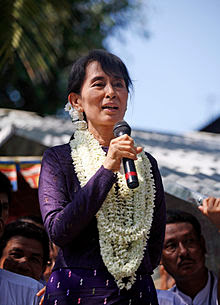Why Does US Pay Honors To Myanmar’s Opposition Leader? – OpEd
By VOR
By Boris Volkhonsky
Myanmar’s opposition leader Aung San Suu Kyi made a visit to the US, where she was welcomed almost like the head of the state. She met US State Secretary Hillary Clinton and US president Barack Obama and received the prestigious Congressional Gold Medal from the US Congress.
Aung San Suu Kyi used her visit to the US for urging the West and first of all the US to soften sanctions against her country. Indeed, on Wednesday the US lifted the sanctions against the Myanmar President Thein Sein and a number of other high ranking officials.

Although in recent years the Myanmar authorities took certain steps towards the liberalization of regime – the release of Aung San Suu Kyi from prison and her visits to the Western countries is a visible confirmation of it – the situation in that country is still far from the ideals of democracy. Why does the US prefer not to see this?
The current situation in Myanmar reminds of the so-called “perestroika” in the USSR in the late 1980ps. Both in Russia, then the Soviet Union and in Myanmar after the decades of tough totalitarian regimes a more or less pragmatic leader comes to power. This leader sees that the previous methods of ruling the country may lead to its collapse.
Like the USSR in the late 1980-s Myanmar now has a recognized oppositional leader, who is also a Noble prize winner like Russian academician Andrei Sakharov. This person becomes the face of a new (or a slightly renewed country). There are similarities even in small details. In the years of the Soviet Union the West kept on saying “Russia” instead of “the USSR” now the West continues to call “Myanmar” using its old name “Burma”.
It is unlikely that someone can answer the question where the reforms initiated by Thein Sein will lead Myanmar to? Will they end like “perestroika” in the USSR with the country’s collapse or the fate of Myanmar won’t be so sad?
But if we want to find an explanation to the growing interest to Myanmar in the West we should not look for it the domestic political processes. The West is intensively using slogans of “democracy” and “human rights” everywhere where it is beneficial and forgets about them in those countries where it has to keep good relations with the old regimes, which are far from the ideals of democracy.
Myanmar is important for the West is first of all because of its strategic location. During all the years of military dictatorship in Myanmar almost the only country which continued to develop full fledged relations with it was China. All other countries including Myanmar’s close neighbor India were concerned with how not to lose face when cooperating with the totalitarian regime.
In the end of 2011, the US State Department declared the switch of the country’s foreign policy focus to the Asian Pacific region. This means that geopolitical standoff between China and the US entered a new level, no matter what US Defense Secretary Leon Panetta, who recently visited Beijing, says.
Chinese strategists see Myanmar as one of the most convenient routes for cargo transportation first of all of oil and gas from the Indian Ocean region to China. If the tension between the US and China in the Eastern and South Chinese seas grows into an open standoff the US Navy can easily block the Strait of Malacca cutting China from fuel supplies. It is the prospect of implementation of China’s plans on laying transportation routes through Myanmar which makes the West hurry up and Like in all other cases talking about “democracy” and “human rights” as well as paying honors to Aung San Suu Kyi is nothing but a smoke screen.
